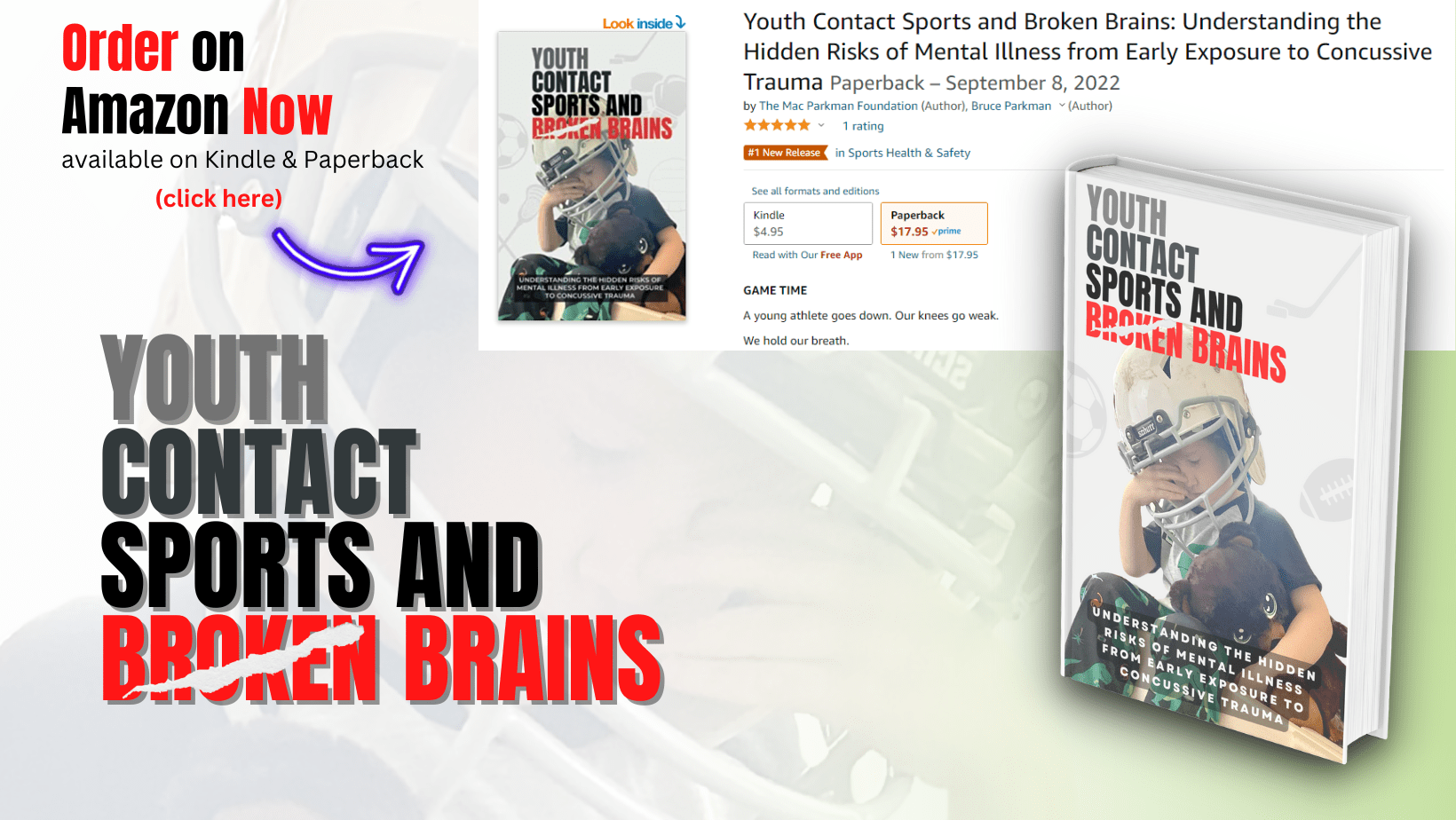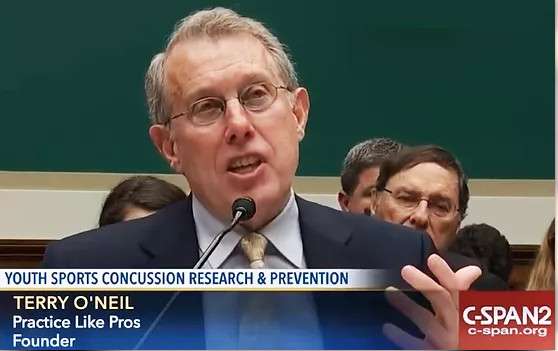Youth Contact Sports and broken brains
Understanding the Hidden Risks of Mental Illness from Early Exposure to Concussive Trauma
We want people to have this information, if you do not wish to purchase a paperback or kindle version – click here to download a copy for free.
About The Book
As parents, you know the risks your kids face every day – drugs, the internet, video games, strangers – and you work diligently and with love to protect them. Why? We do so because we are aware of those risks.
Well, I didn’t know about the risks of concussive and subconcussive trauma that we discuss in this book. I couldn’t protect my son . . . and I lost him.
That is why I wrote this book, to try to heal through the sharing of knowledge that I have gained over the last year or so. That there is a demonstrable link between concussive sports, developing brains and mental illness. I want you to know what I know. . . You don’t want to be in my club.
Especially when it is avoidable.
~ Bruce Parkman
Think of the millions of American children, teenagers, and adults who have been exposed to years, sometimes decades, of contact sports with little understanding of the physiological damage those years of contact and trauma can do to a brain.
What People say
What’s inside
Part 1. Life and Death
01 MAC
02 Mac’s Last Day
Part 2. Causes and Effects of Subconcussive Trauma
03 Understanding the Iceberg
04 Your Child’s Brain
05 Brain Development
06 Understanding Concussive and
Subconcussive Trauma
07 A Young Brain’s Vulnerability to
Trauma
08 Contact Sports, Brain Damage, and
Mental Illness
Part 3. What You Can Do
09 What Can Parents Do?
10 Understanding Total Trauma: It’s
More Than Playing One Sport!
11 The Future of Contact Sports
Back Cover
GAME TIME
A young athlete goes down. Our knees go weak.
We hold our breath.
The seconds stretch into minutes, but finally the athlete rises. We cheer.
The athlete rubs their head, then bravely plays on. We breathe again. No damage done.
Or so we think.
How familiar is this sight to parents and families around the country? How many times a week does this take place?
Sports related injuries, suffered by child athletes, often go unreported and undiagnosed. Here in Youth Contact Sports And Broken Brains, Bruce Parkman, tells the story of his athletic son, Mac Parkman, and how his repetitive exposure to concussive/subconcussive trauma caused him to silently suffer with depression, schizophrenia, and suicidality, before taking his life at the age of 17.
Sports have a long history in society and the discussion of these issues may seem an unwelcome cultural shift, but in Youth Contact Sports And Broken Brains Bruce Parkman takes a logical and scientific approach to linking mental illness with concussive/subconcussive trauma suffered by young athletes in contact sports.
Mac’s story and the family’s vulnerability are powerful and followed by undeniable science. Youth Contact Sports And Broken Brains breaks down the science of brain development, repetitive brain trauma, and their links to mental illness while giving parents the information they need to keep their children safe when participating in contact sports.
It is important to know:
- The human brain is not designed to handle repetitive trauma!
- Concussive/subconcussive trauma cannot be prevented by wearing helmets or pads.
- The exposure of a developing brain to subconcussive and concussive trauma can cause significant impact to the brain’s structure which over time can lead to cognitive and behavioral challenges, including mental illness.
- Repeated episodes of concussive/subconcussive trauma can cause significant changes to the structure and function of the brain in a condition known as Chronic Traumatic Encephalopathy (CTE).
- Every child that plays a contact sport will suffer subconcussive trauma at every practice and game.
- Any damage done to the brain cannot be accurately assessed and its impacts will not be seen for years or decades after being damaged.
- There are forms of non-contact sports and numerous athletic activities for kids to enjoy…let them be kids!
This book and The Mac Parkman Foundation was formed out of the loss of a great young man to suicide at the age of 17 after struggling with mental illness caused by prolonged exposure to concussive and subconcussive trauma from contact sports at a young age.
Proceeds from this book will directly fund research and education on the links between concussive/subconcussive trauma and mental health surrounding contact sports and youth athletes.
Chapters
Pages
“Youth Contact Sports and Broken Brains” is a must-read for all parents of youth athletes. Bruce Parkman is honoring his son, Mac, by sharing his heartbreaking story and informing parents of the science linking brain trauma and mental illness. He breaks down the science of brain development, concussions, repetitive brain trauma, and mental illness, to give parents the knowledge they need to keep their children safe on the field, court, pitch, or mat. This book is a gift to parents who want to protect their child’s future while also providing them with the many benefits that youth sports have to offer.
About the author.


Bruce Parkman was born in Massachusetts and entered the Army in 1980 and spent 21 years in the service, including 18 years as a Green Beret serving in a variety of assignments in 7th and 10th Special Forces Groups before retiring as a Sergeant Major in May of 2001. He married Perri in 2001 and with his two daughters moved to New Mexico and Colorado where they raised their family and he started several businesses in defense contracting, cybersecurity and analytics. He currently is the CEO of Blue Light a software development company. He has been a founding member of the Green Beret Foundation and the Global SOF Foundation and has served on the Special Operations Transition Foundation Board.
With the passing of his son Mac, Bruce Parkman devoted himself to understanding why so many young athletes are living with mental illness or taking their lives. His findings led to the formation of the Mac Parkman Foundation for Adolescent Concussive Trauma and to writing this book. He currently is on the Veterans Advisory Board for the Concussion Legacy Foundation and supports Project Enlist, which recruits veterans to donate their brains for research. Mr. Parkman has donated his brain as well so that he can be close to his son.
Mr. Parkman lives in Florida with his wife and dog Cleo and does his best to honor Mac every day. He can be reached at Bruce@mpfact.com
Bruce Parkman






